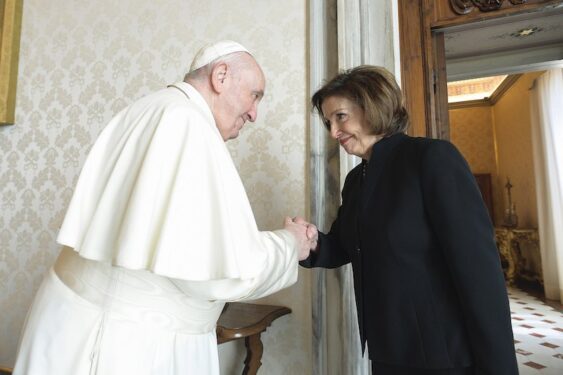
By Inés San Martín
ROME (Crux) — Two days after Archbishop Salvatore Cordileone announced that U.S. House Speaker Nancy Pelosi was barred from receiving Communion in San Francisco over her support for abortion rights, Pope Francis offered support to a pro-life demonstration, saying life is a gift from God.
On Sunday, Pope Francis thanked those who took part in Scegliamo la Vita (Let’s Choose Life), Saturday’s march and pro-life demonstration in Rome, applauding participants for “your commitment in favor of life and in defense of conscientious objection, the exercise of which is often attempted to be restricted.”
The pontiff said that “unfortunately,” in recent years “there has been a shift in the common mentality, and today we are increasingly inclined to think that life is an asset at our total disposal, which we can choose to manipulate, give birth to or let die as we please, as the exclusive outcome of an individual choice.”
“Let us remember that life is a gift from God,” he said. “It is always sacred and inviolable, and we cannot silence the voice of conscience.”
Pope Francis’ remarks came at the end of his weekly Regina Caeli prayer.
Saturday brought more than 100 Italian pro-life associations, and the families and citizens they convened, together in Rome to promote the culture of life from conception to natural death, and in support of the most fragile, insisting that the rights of women and unborn children go hand-in-hand and that they both need to be supported.
Also mentioned by several of the speakers on Saturday, was the possibility of the Supreme Court in the United States overturning Roe v. Wade, the 1973 ruling that legalized abortion.
In a letter to Pelosi released Friday afternoon, Archbishop Cordileone wrote that he had informed the California Democrat, who has San Francisco as her residence but spends most of her time in Washington, that “should you not publicly repudiate your advocacy for abortion ‘rights’ or else refrain from referring to your Catholic faith in public and receiving holy Communion, I would have no choice but to make a declaration, in keeping with canon 915, that you are not to be admitted to holy Communion.”
One of the few times Pope Francis publicly addressed the issue of pro-abortion politicians receiving Communion was in 2021. He said that Communion is for those who are “in the community,” and that those who support abortion are “outside the community.”
However, he also said that in these cases, it’s a pastoral matter that must be addressed by the individual’s pastor. Pope Francis said that he’s never denied Communion to anyone, but also that “I don’t know if any came in this condition. But I was never conscious of having in front of me a person like the one you describe,” meaning a politician who is an abortion rights advocate and a practicing Catholic.
Pope Francis also said that “Communion is not a prize for the perfect,” but a “gift, the presence of Jesus in his church, and in the community. This is the theology.”
“Then, those who are not in the community, cannot receive Communion,” he said. “Out of the community: excommunicated. It’s a harsh word, but they don’t belong in the community, because they were not baptized, or because they are estranged from it.”
Pope Francis then referred to the “abortion issue,” saying that it’s “more than a problem: It’s a homicide. No middle terms. Whoever does an abortion, kills.”
During his remarks Sunday, Pope Francis also referred to China, which on Tuesday celebrates its patroness, Mary Help of Christians, who’s particularly dear to Catholics.
Speaking days after the arrest and subsequent release on bail of Cardinal Joseph Zen, bishop emeritus of Hong Kong, the pontiff said that he wanted to express his “spiritual closeness” to all Chinese Catholics ahead of the Marian feast.
“I am attentively and actively following the often-complex life and situations of the faithful and pastors, and I pray every day for them,” he said, before inviting the thousands who had gathered in St. Peter’s Square to unite in this prayer so that “the church in China, in freedom and tranquility, might live in effective Communion with the universal church, and might exercise its mission of proclaiming the gospel to everyone, and thus offer a positive contribution to the spiritual and material progress of society as well.”
